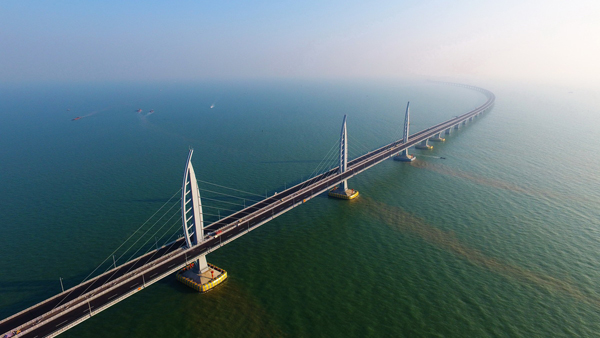Bay Area growth remains province's focus

Along with deepening ties with Hong Kong and Macao, Guangdong to prioritize innovation, development of new industries. [Photo provided to CHINA DAILY]
Along with deepening ties with Hong Kong and Macao, Guangdong to prioritize innovation, development of new industries
Editor's note: This year, the Communist Party of China is celebrating the 100th anniversary of its founding. China Daily is publishing a series of stories looking at the tremendous changes that have occurred in provinces, autonomous regions and municipalities under the leadership of the Party. They also include stories of the people and places that have left indelible marks in the Party's path to glory.
The growth of the Guangdong-Hong Kong-Macao Greater Bay Area, the most dynamic city cluster of South China, will be further promoted with a focus on high-quality development in the following years, said a senior official.
Ma Xingrui, governor of Guangdong province, said that during the 14th Five-Year Plan (2021-25) period, the province will give priority to scientific innovation and the development of new industries.
"As the Communist Party of China marks the 100th anniversary of its founding this year, the Guangdong government aims to fully implement the CPC Central Committee's directive to build the GBA into a world-class bay area," he said.
The rapidly-growing area consists of nine cities in Guangdong and the two special administrative regions of Hong Kong and Macao. According to data from the provincial government, the GDP of the GBA reached 11.5 trillion yuan ($1.78 trillion) last year.
That amount is higher than South Korea's $1.62 trillion, Brazil's $1.39 billion and Australia's $1.33 trillion during the same period, according to data from the Organization for Economic Cooperation and Development.
Since the start of the building of the Greater Bay Area in 2017, Guangdong, Hong Kong and Macao have strengthened their interconnectivity in many aspects, including infrastructure construction and people-to-people exchanges, Ma said.
Whether the GBA can be built into a world-class bay area depends on its innovation capacity, Ma said, adding that Guangdong cooperated with both SARs to build 20 new joint laboratories.
More than 10,000 large-scale scientific instruments in Guangdong are now available for scientists from both Hong Kong and Macao, and the nine mainland cities of the GBA have set aside 2.39 billion yuan to subsidize the personal income taxes of overseas talent, the governor said.
Building up the GBA is a major national strategy that has been directly planned and led by Xi Jinping, general secretary of the CPC Central Committee, Ma said.
The project is seen as a move to further promote reform and opening-up in the New Era as well as a way to further support the "one country, two systems" principle in the SARs, he said.
Guangdong will make further efforts to help Hong Kong and Macao integrate into the country's overall development and promote the SARs' long-term prosperity and stability, he added.
On July 1, 2017, Xi witnessed the signing of a framework agreement between the National Development and Reform Commission and the governments of Guangdong, Hong Kong and Macao on deepening their cooperation. It marks the launch of the building of the Greater Bay Area.
In February 2019, the GBA development plan was officially released as part of China's overall reform and opening-up strategy, aiming to build the country's southern region into a model of unique development and a world-class bay area and city cluster.
Over the past four years, many achievements have been made in the development of the GBA, and cooperation between Guangdong, Hong Kong and Macao has been further promoted, said the provincial governor.
Twenty-one enterprises in the GBA were listed on the Fortune Global 500 last year, compared with just four in 2017. Moreover, the number of national-level high technology companies in Guangdong reached 53,000 last year, about 20,000 more than in 2017, according to statistics from the provincial government.
The improvement of the modern transportation system in the bay area has also greatly facilitated people's travel between the province and the SARs, Ma said. Over 1,200 kilometers of high-speed railway have been built in the GBA, and it now takes only 30 minutes to drive from Hong Kong to Zhuhai, Guangdong, and even less time to drive from Zhuhai to Macao.
To encourage young people to start businesses in the bay area, Guangdong, Hong Kong and Macao have jointly built 13 innovation bases. More than 4,000 young people from the SARs are currently part of over 600 entrepreneurship teams in the province, according to the provincial government.
Zhang Yunfei, founder of Zhuhai Yunzhou Intelligence Technology, an unmanned ship developer, said the GBA is an ideal place for entrepreneurs like him to start their businesses.
After completing his postgraduate studies at Hong Kong University of Science and Technology, Zhang went to Zhuhai and founded his company in 2010. The company's products have been sold in more than 40 countries.
"The Greater Bay Area has entered a new stage of innovation-driven development, and the world-class scientific foundation and abundant talent here have made it a great place for young people to pursue their dreams," Zhang said.
Ge Changwei, director of the Guangdong Development and Reform Commission, said that the research and development expenses in the nine mainland cities in the GBA reached more than 300 billion yuan last year.
"Industrial innovation is our advantage, and we will continue to consolidate this," he told China Daily.



 Print
Print Mail
Mail

